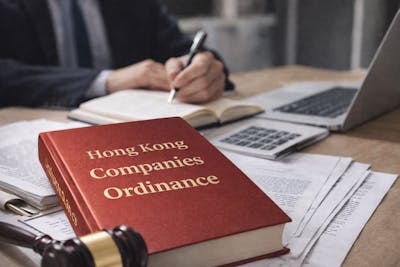Hong Kong’s Companies Ordinance (Cap. 622) outlines clear shareholder rights, including voting power, dividend entitlements, and protections in disputes. But if you don’t know how to use these rights, you can’t safeguard your investment or influence company decisions.
This guide covers shareholder rights, responsibilities, and legal protections in Hong Kong. Learn how shares are issued, their impact on ownership, and how to protect your investment.
What is a Shareholder in a Hong Kong Company?
A shareholder in Hong Kong is any individual or company that owns at least one share in a company. Shareholders play a key role in corporate governance. However, they also face financial risks—if the company's value declines, shareholders may see losses in their investments.
Shareholders can influence a company’s direction but do not manage daily operations unless they also serve as directors. Their level of control depends on the number and type of shares they own. In some cases, shareholders with majority ownership have greater decision-making power, while minority shareholders may have limited influence.
If you’re a shareholder, it’s important to understand how shares are issued. This helps you protect your ownership and stay informed about changes that might affect your stake.
How Are Shares Issued in Hong Kong?
The procedure for issuing shares in Hong Kong is governed by the Companies Ordinance (Cap. 622), Ord. No. 28 of 2012, Part 4 – Share Capital. Here's how the legal process works:
1. Directors Must Have Authority to Allot Shares
- Section 140 (A3603): Directors may only allot shares or grant rights to subscribe/convert securities if permitted by shareholder approval or specific exceptions (e.g. rights issues, bonus shares).
2. Company Approval by Shareholders
- Section 141 (A3605): The company must pass an ordinary resolution to authorize share allotment. This resolution can be general or specific and may be valid for a fixed period (typically up to the next AGM or 12 months).
3. Return of Allotment Must Be Filed
- Section 142 (A3607): The company must submit a Return of Allotment (Form NSC1) to the Companies Registry within 1 month. This includes:
- Number and class of shares allotted
- Names and addresses of allottees
- Consideration paid (cash or non-cash)
- Capital statement under Section 201
4. Register the Shares in the Company’s Register of Members
- Section 143 (A3611): The allotment must be registered by updating the company’s member register within 2 months.
5. Issue Share Certificates
- Section 144 (A3613): Certificates for newly issued shares must be completed and ready for delivery within 2 months, unless otherwise provided in the issuance terms.
For companies offering shares to the public (e.g. IPOs or secondary offerings), additional obligations apply:
- Must prepare a prospectus under the Companies (Winding Up and Miscellaneous Provisions) Ordinance.
- Must receive Securities and Futures Commission (SFC) and Hong Kong Exchanges and Clearing (HKEX) approval before publication.
- Publication in the Hong Kong Gazette is not required for standard share issuances—only for special circumstances (e.g. lost certificates under Section 164, A3637).
Why Should Shareholders Care About Share Issuance?
New shares can directly impact existing shareholders. Here’s why you should pay attention:
- Share Dilution: If a company issues new shares without offering them to current shareholders first, your ownership percentage and voting power may decrease.
- Preemptive Rights: While not mandatory in Hong Kong unless written into a company’s constitution, HKEX encourages listed companies to offer new shares to existing shareholders first—typically through rights issues.
- Company Financial Health: New shares can raise funds for growth, but frequent issuances may indicate financial instability.
Shareholder Requirements in Hong Kong
In Hong Kong, there are no nationality restrictions for shareholders. They can reside anywhere, and shareholder meetings do not have to take place in Hong Kong. However, shareholders in Hong Kong must:
- Be at least 18 years old
- Have their details, including name, occupation, and address, publicly listed in the Companies Registry
For those who prefer privacy, one option is to hold shares through an offshore company registered in Hong Kong. This allows business owners to operate without directly disclosing their personal information.
Types of Shares in a Hong Kong Company

Companies in Hong Kong can issue different types of shares, each with specific rights and restrictions. Understanding these distinctions is crucial, as they determine voting power, dividend entitlements, and ownership control.
1. Ordinary shares
The most widely issued and grant equal voting rights—typically one vote per share. Shareholders with ordinary shares receive dividends and capital distributions in the event of company liquidation.
2. Preference shares
Offer priority in receiving dividends and capital repayment before ordinary shareholders. However, they usually come with limited or no voting rights. These shares are commonly issued to investors looking for a more stable return.
3. Deferred ordinary shares
Carry fewer rights than ordinary shares. Holders receive dividends only after other share classes have been paid or after a specific event. They also do not have voting rights in company matters.
4. Non-voting shares
Do not grant voting rights or the ability to attend shareholder meetings. These shares are often issued to employees or family members of key shareholders who are not involved in decision-making.
5. Redeemable shares
Structured to be repurchased by the company at a future date, either on a fixed schedule or at the company’s discretion. They are commonly issued to employees, allowing the company to buy back shares if the employee leaves.
6. Management shares
Under Hong Kong law, companies are allowed to issue multiple classes of shares with different voting rights, as long as this is clearly stated in the Articles of Association and disclosed to shareholders.
For listed companies, the HKEX Listing Rules generally prohibit weighted voting rights, but exceptions exist for certain types of companies—particularly innovative or tech issuers listed under Chapter 8A of the HKEX Main Board Rules.
Key Rights of Shareholders in Hong Kong
After determining what type of shares you hold, it’s important to understand the rights that come with share ownership.
Right to Vote
Shareholders have the right to vote on company matters, including electing directors and approving major changes such as mergers or liquidation. Voting takes place at general meetings, where each shareholder typically has one vote per share owned. This means shareholders with more shares have greater influence over company decisions.
Right to Attend and Participate in General Meetings
Shareholders have the right to receive notice of general meetings and participate in discussions that impact the company.
- Those holding at least 5% of voting rights can request a general meeting to propose resolutions.
- For critical decisions—such as amending the articles of association, changing the company name, or voluntarily winding up—a 75% supermajority approval is required.
Since April 28, 2023, companies can now hold fully virtual or hybrid general meetings to increase accessibility.
Right to Receive Dividends
As part-owners of the company, shareholders have the right to earn dividends when the company is profitable. However, dividends are not guaranteed—they are only distributed if the board of directors declares a dividend for a given period.
Right to Approve Major Transactions
Under the Listing Rules, shareholders must approve certain large-scale business deals that could significantly impact the company’s financial health. This includes:
- Notifiable transactions (such as mergers and acquisitions) that exceed a certain size relative to the company’s assets.
- Connected transactions involving related parties, which require approval from independent shareholders and review by an independent board committee and an independent financial adviser.
Right to Fair Treatment in Takeovers
Under the Hong Kong Code on Takeovers and Mergers, shareholders have the right to accept or reject buyout offers when a company undergoes a takeover.
If any individual or group acquires 30% or more of a company’s voting rights, they must make a mandatory general offer to all other shareholders, giving them an exit option.
Right to Access Company Accounts and Reports
Shareholders have the right to receive and review important company documents, including audited financial statements, directors’ reports, and auditor reports. These documents help shareholders assess the company’s financial health and performance.
Right to Distribution in Liquidation
If a company is liquidated, shareholders are entitled to receive a distribution of the company’s remaining assets after all debts and obligations to creditors have been settled.
Right to Make Decisions Through Resolutions
Shareholders are responsible for approving key company decisions at general meetings. These decisions are made through ordinary or special resolutions:
- Ordinary resolutions require a simple majority (more than 50%) to pass.
- Special resolutions require at least 75% approval for critical decisions, such as amending the company’s constitution.
Right to Appoint a Proxy
Shareholders who cannot attend a general meeting have the right to appoint a proxy to vote on their behalf. The proxy does not need to be a shareholder, but the shareholder must declare this in the notice of the general meeting.
Right to Inspect Company Records
Shareholders can inspect the company’s shareholder register and other corporate records, ensuring transparency in company ownership and governance.
This right allows shareholders to verify company activities and hold management accountable.
Right to Seek Legal Remedies
If shareholders face unfair treatment, they can take legal action under the Companies Ordinance. They can:
- File unfair prejudice petitions if company affairs are conducted in a way that harms their interests.
- Bring derivative actions against directors who breach fiduciary duties, allowing them to sue on behalf of the company. Courts may order compensation or require the company to buy out affected shareholders.
Right to Shareholder Activism
Although shareholder activism has traditionally been low in Hong Kong, it is gaining traction, especially in companies transitioning from family-controlled ownership to more diversified structures. Regulatory changes now encourage investors to engage in company affairs, ensuring their rights are upheld and their interests protected.
Shareholder Responsibilities & Duties
Being a shareholder in Hong Kong isn’t just about owning shares—you also have responsibilities. Your actions impact the company, so it’s important to stay informed and act in the company’s best interest.
| Responsibility | Description |
|---|---|
| Follow Company Rules and Laws | Shareholders in Hong Kong must comply with the company’s articles of association and corporate laws, ensuring all actions follow legal and company policies. |
| Make Fair and Informed Decisions | When voting on company matters, shareholders should act in good faith and consider what benefits the company, not just personal gain. |
| Stay Updated on Company Performance | Shareholders must review financial reports and company records to stay informed about the business’s financial health. |
| Avoid Conflicts of Interest | If a shareholder has a personal business deal with the company, it must be approved by independent shareholders to ensure fairness. |
| Hold Directors Accountable | Shareholders can elect and remove directors. If directors mismanage funds or act unfairly, shareholders can take legal action under the Companies Ordinance. |
| Participate in Meetings and Voting | Shareholders should attend meetings, vote on key issues, and appoint proxies if they cannot attend. |
| Encourage Ethical Business Practices | Shareholders should support transparent, ethical, and responsible business operations to promote long-term success. |
Can Shareholder Rights & Shares Be Changed?
Yes, shareholder rights and share structures can be changed, but it must follow legal procedures under the Companies Ordinance. Changes typically involve amending the Articles of Association, which outlines shareholder rights, voting powers, and dividend entitlements.
How Can Shareholder Rights Be Changed?
To change shareholder rights, a company must first pass a special resolution with at least 75% shareholder approval at a general meeting.
After that, it must file the required documents with the Companies Registry, including a copy of the special resolution, a notice of alteration (Form NAA1 or NAA2), and a certified copy of the updated Articles of Association.
What Protections Do Shareholders Have?
The Companies Ordinance provides protections to prevent unfair changes to shareholder rights. If a specific class of shares is affected, shareholders of that class may have statutory protections to challenge or oppose the change.
Can the Type of Shares Be Changed?
Yes, a company can reclassify shares or issue new ones with different rights. However, this must be done through a formal process that may require shareholder approval and updates to the Articles of Association.
Final Thoughts
Knowing how shareholders in Hong Kong operate helps protect your investment and ensure smooth business operations.
- Shareholders have key rights and duties, including voting and receiving dividends.
- Share transfers and structure changes must follow legal procedures to be valid.
- Staying informed helps you manage risks and maximize opportunities.
Need a hassle-free way to manage your company in Hong Kong? Air Corporate makes business registration, accounting, and compliance easy—all 100% online.






